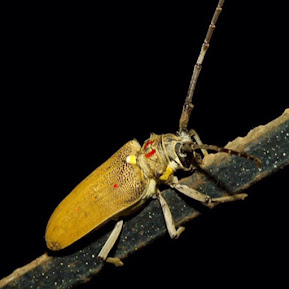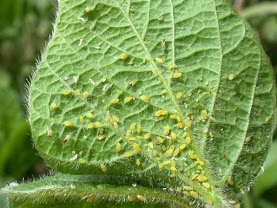Beauveria bassiana and Metarhizium anisophile to the rescue
These two are entomopathogenic fungi which are currently used in agriculture to control insect pests ; in simple terms, these fungi kill insects. The fungal spores comes in contact with the insect body and enters through its cuticle and germinates inside, thereby invading its internal body parts and secreting toxins which then mummifies and kills the insect. The former one causes White Muscardine Disease and the later causes Green Muscardine Disease.
Grubs treated with M. anisophile, B. bassiana And Verticilium leccani
When the insect dies the fungi produces spores which then disseminate on healthy insects thus the cycle continues and the pest population is reduced.
Beauveria bassiana and Metarhizium anisophile are available in Wettable powder and liquid Formulations.
Dosage
Foliar spray : 2-3 mL/L of water (Liquid formulation). 5-8g/L of water (Wettable powder) Spray on the insects, leaves and stem. (Avoid spraying on flowers)
Compost inoculum: 8-10 g/ kg of compost to kill soil invading pests like root borers and grubs
Following are some of the pests which could be controlled through Beauveria and Metarhizium
LEAF CURL VIRUS in papaya by MEALY BUGS and WHITEFLIES
Mealy bugs and whiteflies are tiny sucking pests which are mostly found in colonies on the underside of the leaves and on the stems. These pests suck the plant cell sap and are vectors for transmitting various viral diseases. The pest population can be controlled by spraying Beauveria and Metarhizium on them and on the leaves.
LEAF MINERS in tomatoes and other vegetable crops
The larvae of the leaf miner fly feeds on the the inner tissue of the leaves by creating tunnels. The white spiral pattern on the leaves are actually the tunnels. If you observe the pattern closely, you'll find tiny larvae feeding inside. These can be controlled by spraying Beauveria and Metarhizium solutions on the infected and healthy leaves.
GRASS HOPPERS, LEAF HOPPERS, BROWN PLANT HOPPERS and LOCUSTS
Grass hopper
Locust
These jumping insects can eat up any leaves that comes in their way. They love vegetable leaves much more than us and can eat up the whole plant in just a day. High population of these insects can result in severe loss in production. B. bassiana or M. anisophile liquid formulations or wettable powder in water will control these pests.FLEA BEETLES
These beetles are almost seen in all vegetables. They're tiny and jump quickly from one place to another. They chew the leaves resulting in shot holes. Severe infestation can result in wilting of the plant. Spraying Beauveria and Metarhizium on the plants when they're seen will control them.
LEAF EATING CATERPILLARS and LOOPERS
Most of the caterpillars hairy and non-hairy feed on the leaves. One caterpillar eating one leaf looks adorable, imagine ten caterpillars eating every leaf and then multiplying. Beauveria and Metarhizium are highly effective on caterpillars and targeting them while they're feeding would be more effective.
FRUIT AND SHOOT BORERS
Fruit and Shoot borers are the most selfish beings in farming. They enjoy the whole fruit and leaves the spoilt fruit which is unfit for consumption and marketing on the plant itself. You'll know that your plants are attacked by fruit and shoot borer if you find a hole with its poop outside or sealed with its poop. After feeding they come out to pupate in the soil, so spraying Beauveria bassiana or Metarhizium anisophile or adding its inoculum in the compost will kill the pest.
Fruit and Shoot borers are the most selfish beings in farming. They enjoy the whole fruit and leaves the spoilt fruit which is unfit for consumption and marketing on the plant itself. You'll know that your plants are attacked by fruit and shoot borer if you find a hole with its poop outside or sealed with its poop. After feeding they come out to pupate in the soil, so spraying Beauveria bassiana or Metarhizium anisophile or adding its inoculum in the compost will kill the pest.
CITRUS HINDU MITES in lemon, pomelo, lime and curry leaves
This pest cannot be seen through a naked eye. You'll know that they've attacked the plants only when you see the damage. They suck the cell sap and result in formation of tiny silver-white spots on the leaf. Severe infestation can lead to premature leaf fall and fruit drops. Foliar spray of Beauveria bassiana or Metarhizium anisophile will keep the plants away from this pest.
This pest cannot be seen through a naked eye. You'll know that they've attacked the plants only when you see the damage. They suck the cell sap and result in formation of tiny silver-white spots on the leaf. Severe infestation can lead to premature leaf fall and fruit drops. Foliar spray of Beauveria bassiana or Metarhizium anisophile will keep the plants away from this pest.
SPIRALLING WHITE FLIES in coconut, banana, soursop, papaya, mango and other fruit trees.
BANANA WEEVIL and other root grubs
This pest attacks the plant, under and near the soil surface. Grubs feed on and bore tunnels into rhizomes, stems and suckers. The destruction weakens the plant and make the stem hollow. Drenching the soil or adding wettable powder of Beauveria and Metarhizium in the compost will control these root borers.
STEM BORERS in cashew, coconut, mango, jackfruit etc.
Cashew stem borer
Mango stem borer
Grub of mango stem borer
Red palm weevil adult, grub and pupa
APHIDS, THRIPS and MITES in brinjal, chilli, beans, tomato, okra, banana, melons etc
Thrips
Yellow aphids
Red Spider mites
These sucking pests transmit viral diseases in plants like mosaic virus, bunchy top virus, leaf curl virus etc. They're mostly seen on the lower side of the leaves and on the stems and stalks. They damage the plant tissue by sucking the cell sap and secrete sweet substance that attracts the ants. Spraying Beauveria and Metarhizium once in a week in the evening will prevent and control these pests.
RHINOCEROS BEETLE in coconut
The beetle damage the palm by boring into the crown and cutting across the fronds and flowers. Damage is seen as V-shaped leaves when it unfolds. This results in loss of leaf area, flowers, nut fall and low yields. The beetle lay eggs in the soil, cowdung, compost, dead tree trunk and dead sheaths. Adding Metarhizium anisophile and Beauveria bassiana as compost inoculum while manuring will control the grubs and by spraying either of the bio-control agents on the canopy while plucking coconuts will kill the beetles.
NOTE:
- Beauveria bassiana and Metarhizium anisophile must be sprayed in the evening hours when the temperature is low. The best way is targeting the pest when it is seen.
- Never spray on the flowers as it might kill bees and butterfly.
- Trichoderma and Metarhizium works well in controlling soil borne diseases and soil invading pests.
- Repeat the spray once in 7 days in winters and once in 4-5 days in summers because the fungal spores cannot withstand temperature more than 33 degree Celsius.
To know about your plant health contact us or book appointments
Email: fruitsofhardwork@gmail.com
Contact: +91-8390113019
Facebook: Fruits of Hardwork
Instagram: fruits.of.hardwork



























Comments
Post a Comment